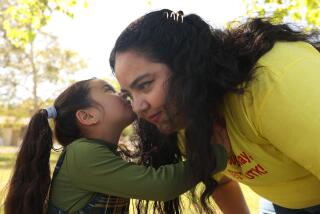TV REVIEW : Children and Literacy: Some Stories of Success
- Share via
We know painfully well that even passing through the public school system doesn’t guarantee that a child will learn to read. As Phylicia Rashad, the host of “First Things First,” reminds us tonight (Channels 28, 15, 24 and 50 at 9), 13 of every 100 students now in grade school will end up functionally illiterate.
The hour stresses the tremendous long-range importance of the simple act of parents reading books to their children at an early age. It also focuses on some uncomplicated but effective ways that parents and teachers around the country have found to get children hooked on books and reading.
The show is part of Project Literacy U.S., a three-year public service campaign of TV shows and outreach programs co-sponsored by Capital Cities/ABC and PBS that are designed to raise public awareness of and combat functional illiteracy in America. “First Things First” is not concerned with hand-wringing or finding fault with children or parents or schools or society or the Reagan Administration.
It’s concerned with local success stories.
In Kentucky, an innovative Parent and Child Education program has learned that a mother’s educational level is the surest predictor of a child’s achievement.
In Louisiana, a reading program designed to teach parents how to read to their small children has captured wide community support.
In Pittsburgh, a “Beginning With Books” program supplies new mothers with reading tips and three free children’s books.
The most interesting and most substantive segment, however, concerns the successes of a program at Clarence Darrow Preschool in Chicago, home of the nation’s worst public school system.
Three- and 4-year-olds dictate their own wonderfully imaginative stories to teachers who later read them back as the authors act them out in front of their class. The children look happy and completely lost in the fun of their learning.
A teaching expert who instituted the program explains that we often forget that play and fantasy play are natural ways for children to develop language and thinking.
Juxtaposed with such simple enlightenment, however, is the attitude of a Chicago first-grade teacher who complains that the wide-eyed, curious and uninhibited Clarence Darrow grads who come to her home room pose a problem because they are too used to walking around class all day. They need to learn discipline, she says. They need to know that they have a chair and they’re supposed to stay seated on it.
That kind of thinking is rarely found in “First Things First,” which demonstrates a loving understanding of children and their natures and, more important, an underlying trust in children and their parents.
Written and produced by Howard Weinberg at WQED in Pittsburgh, it does a nice job of proving how ordinary people can help children reach their full potential when armed with simple truths.
More to Read
Sign up for our Book Club newsletter
Get the latest news, events and more from the Los Angeles Times Book Club, and help us get L.A. reading and talking.
You may occasionally receive promotional content from the Los Angeles Times.









